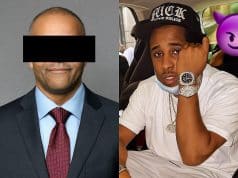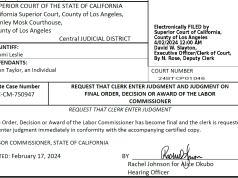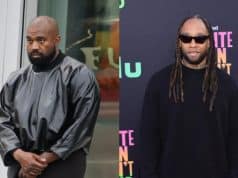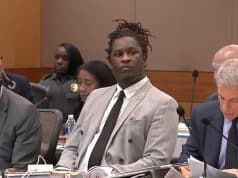
‘Who is this Robert Smith?’: A quiet billionaire makes some noise with $20 million gift to the African American museum
Billionaire philanthropist Robert Smith is the second-highest private donor — at $20 million — to the new National Museum of African American History and Culture. Oprah Winfrey beat him by $1 million.
In 2013, when the founders of the Smithsonian’s National Museum of African American History and Culture were seeking donors, people directed them to one man: Robert F. Smith.
“We kept wondering, ‘Who is this Robert Smith?’ ” said Adrienne Brooks, director of development for the museum. Meeting Smith became a priority, said Lonnie G. Bunch III, the museum’s founding director. “We wanted to meet him. And soon,” Bunch said, laughing.
Soon many more people will know Robert Smith by name as the museum celebrates its grand opening this weekend. The private-equity financier was the museum’s second-biggest private donor, with a $20 million gift. Oprah Winfrey was No. 1, with $21 million.
Smith has built a fortune that’s made him one of the nation’s richest men — worth $2.5 billion, according to Forbes — but until now he has kept his work and philanthropy relatively quiet.
Even the website of his company, Vista Equity Partners, does not have a picture of him. Better, he had thought, that investors and executives know him first by his abilities. If they saw only the caramel skin of an African American, he might lose out on opportunities.
As Vista’s chairman and chief executive, he is in the business of buying, growing and selling off software companies. Vista’s portfolio has 35 companies with $26 billion in assets under management. He is the majority shareholder of Vista’s management company.
Beyond Wall Street and Silicon Valley, Smith long enjoyed moving in relative obscurity. That changed last fall when Forbes magazine put him on its cover, with an article for which he declined to be interviewed.
Now in an exclusive interview with The Washington Post, he’s ready to talk about his life’s work and the powerful social force that has pulled him out of the shadows: the racial tension escalating across the nation. Smith said he grew fearful that the very fabric of the country that allowed his parents to earn doctorate degrees and him to build a successful business is vulnerable.
Watching TV news, he saw the unrest in Ferguson, Mo., after the 2014 fatal shooting of an unarmed black youth, Michael Brown, by police. Last year he watched the turmoil following Freddie Gray’s funeral in Baltimore. Across the land, he feared, a sense of opportunity is giving way to rising hopelessness and despair.
“The vision I was sold as a kid is unraveling. I see the little tears in the fabric of society every day. This cannot be,” Smith said in the interview.
His philanthropic efforts go back years. Through the Fund II Foundation, of which he is the founding president, he has supported nonprofit groups that focus on African American culture, human rights, music education and the environment.
It was time to emerge, he thought, and do more. “We have to do something,” he said. “We have to do something for our community.”
Telling its stories, for instance. Through his donation to the museum, visitors will be able to leverage the power of technology to chronicle and share personal narratives — whether they are standing in the building or logged on from home across the world.
Smith says he is often reminded he is still a black man in this country. At least three to seven times a year, he says, he is stopped by police as he drives himself to the airport in Texas. The officers run his tags and check his license. He’s told he was speeding or changed lanes without signaling. The officers send him off, often without a ticket.
“You shouldn’t have to be fearful of your life,” he said. “You should be able to drive to the airport and not be stopped three to seven times a year.”
But Smith never worries about missing his flight. His private plane won’t leave without him.

Robert Smith was raised in a home where music was treasured. It still permeates his life, even when he’s talking about computer programs. “A beautifully written software code is a lyrical concerto,” he said. (Ricky Carioti/The Washington Post)
Smith, 53, swaggers into the room, his 6-foot frame clothed in a lavender blue, three-piece custom suit with matching blue reading glasses. He has more than 50 pairs of the glasses in various colors, each coordinated with his suits. “I brought three-piece suits back in style,” he jokes with his broad smile.
Visiting Washington from his home in Austin, Smith sits in the Madison Hotel dining on a lunch of hummus, a green salad and olives as he shares his story.
With his grandfather’s name as his middle name, Robert Frederick Smith grew up the son of two high school principals in a predominately black neighborhood in Denver. His mother was born in Northwest Washington and graduated from Dunbar High before going to graduate school in Denver. There she met Smith’s father.
His father, who attended college on a band scholarship, made sure music filled the house; the family gathered around the piano and organ in the evenings. Smith learned to play. And each night as they went to bed, Leontyne Price sung arias on the stereo.
Music still permeates his life, even when he’s talking about computer programs. “A beautifully written software code is a lyrical concerto,” he said.
Smith uses the arts, specifically music, as a litmus test to determine a person’s passion. He manages 42,000 employees with 670,000 software customers. The best employees, he says, are those who are interested not just in finance or computers but in music, theater and the arts as well.
“I look for a complete package. When someone is a complete package, they are more engaged, more excited, more passionate about what they are doing,” he said.
Smith’s parents stressed to him and his older brother the importance of philanthropy. As a child, he watched his mother send off a $25 check to the United Negro College Fund each month.
In high school, Smith became interested in computers. As a junior, he talked his way into a college internship at Bell Labs. He spent summers and Christmas breaks figuring out how computers worked — or didn’t
“I got hooked on technology,” Smith said. “The excitement of figuring a complex problem out creates a eureka moment. It’s one of the best moments in life.”
A fly fisherman and avid reader, Smith peppers his conversation with quotes from favorite works, from Walt Whitman’s poems, which Smith said “help people understand what America is about,” to Paulo Coelho’s “The Alchemist” and Ta-Nehisi Coates’s “Between the World and Me,” which Smith said “wonderfully” chronicles the challenges of black youth day-to-day survival.
Recently in Baltimore, he had some advice for surviving those challenges. “Every day I need you to set a new goal,” he told a group of African American 20-somethings. They were part of a free technical career job-training group for inner-city youth and veterans at a nonprofit group called NPower Inc. The foundation donated $3 million to it.
“With the process of discovery, you fail a lot,” he said. “And you learn a great deal from those failures, so the next time you can avoid those mistakes.”
NPower is just one nonprofit that has drawn his interest. Recently Smith met with baseball legend Cal Ripken Jr. in Baltimore. Ripken runs a mentoring program for inner- city youth in which cops volunteer as baseball coaches. It’s called “Badges for Baseball.” The foundation donated $3 million to the group.
Ripken had some advice for Smith. At the height of his baseball career, he was constantly sought after for donations. So he had to decide on the causes that were most important to him.
“You can’t contribute to all good causes. You have to be selective to those that have a significant impact,” Ripken said. “You can’t be all things to everyone and still be effective.”
 Robert Smith meets with baseball legend, Cal Ripken Jr., at his Badges for Baseball program for inner-city youth. Ripken had some advice for his fellow philanthropist: “You can’t contribute to all good causes. You have to be selective to those that have a significant impact.” (Ricky Carioti/The Washington Post)
Robert Smith meets with baseball legend, Cal Ripken Jr., at his Badges for Baseball program for inner-city youth. Ripken had some advice for his fellow philanthropist: “You can’t contribute to all good causes. You have to be selective to those that have a significant impact.” (Ricky Carioti/The Washington Post)Figuring out complex problems is what got Smith interested in computers.
He studied chemical engineering at Cornell and earned his MBA from Columbia University.
After graduate school, he was persuaded to go into investment banking at Goldman Sachs. Smith was soon advising on billion-dollar mergers and acquisitions for technology companies such as Microsoft, Apple and Texas Instruments.
“Robert was always a very self-confident young guy, and he wanted to make sure that he had a significant role in whatever he did,” said Gene Sykes, 58, a managing director at Goldman who was Smith’s supervisor in the 1990s. “He always sought an opportunity to build something that was valuable. He wants to make the entire community better.”
Smith left Goldman in 2000 to start Vista Equity Partners. There he focused on buying and selling little-known software companies. According to Preqin, a London-based private-equity tracker, Vista Equity Partners is among the “top 50 most consistent performing buyout fund managers” in the world for 2016.
By the time he was 35, Smith had earned his first million, he said. Less than 20 years later, his first billion. Along with balancing his business and philanthropy, Smith juggles family life. He’s the father of five children, three from his previous marriage and two with his wife, Hope Dworaczyk, a former Playboy model and national advocate for foster children.
For years, Smith shied away from photographs. He says he is now more comfortable in the public eye, partly because he wants others, particularly young African Americans to see what he is doing.
As a college student, he read about pioneering black executives Kenneth Chenault, CEO of American Express, and Richard Parsons, former chairman of Time Warner and Citigroup.
“I thought, ‘If they could do it, so can I,’ ” Smith recalled. “Now I want people to say, ‘If Robert Smith can do it, I can do that and more.’ ”
Parsons, 68, said Smith focused on doing the work, instead of talking about it in business publications and on TV news shows.
“The brother has been working,” Parsons said in an interview.
Parsons, who, like Chenault and Winfrey, is on the new African American Museum’s board of directors, said Smith chose to spend more of his time perfecting his craft in private equity and software companies than being in the public eye.
“If you’re successful and do the hard work and focus on your job, focusing on the mission instead of the role, your success will be recognized and given visibility,” Parsons said. “That is where Robert is right now.”
 Robert Smith high fives Rashaun Jefferson, 10, of Baltimore. “Every day I need you to set a new goal,” Smith has told young African Americans. (Ricky Carioti/The Washington Post)
Robert Smith high fives Rashaun Jefferson, 10, of Baltimore. “Every day I need you to set a new goal,” Smith has told young African Americans. (Ricky Carioti/The Washington Post)This year, Smith became the first African American — and the first non-New Yorker — to be named chairman of New York’s 125-year-old Carnegie Hall. Using digital media, he wants to introduce live symphony music to children across the country, which he thinks is especially important now that many schools have dropped music classes.
Smith also plans to use his computer skills in his role as chairman of the Robert F. Kennedy Center for Justice and Human Rights. For much of the organization’s 48 years, it has fought social injustice outside of the United States, he said. He wants to use social media applications to train human rights activists in American cities.
Donations from Smith personally, or from the foundation he leads, come with directives. “If I can inspire other business leaders to step out there and do more community work — real work, not just going to a boys and girls club and writing a $10,000 check and going to a gala,” he said. “We want to create an environment for these young people that will help them become their best selves.”
Smith wants computers and software to become for African Americans what the steel mills and auto plants were for a generation of blacks in the early 20th century. Creating jobs in technology, Smith says, is the fastest way to create wealth today.
“This is the first time in history you can create wealth and not have access to capital. You just need intellectual property. A blogger who has a large audience can create wealth by attracting advertisers,” he said. “I am showing the current generations of African Americans they can do it, too. So the next generation can go even higher.”
In January, Smith steered $50 million to Cornell University, donating $20 million personally and overseeing a $30 million investment through the foundation. The directive: Smith wants to boost the number of black and female students at Cornell’s engineering school. Only 3 percent of Cornell’s 5,000 engineering students are African American, and 42 percent are female, said Lance Collins, the school’s dean.
Cornell currently partners with New York high schools as a pipeline for its engineering school. Smith directed the college to expand the relationship to schools outside New York that may have a higher concentration of talented black students.
Smith also directed the school to begin offering financial aid packages to its graduate students, as opposed to only undergraduates. Cornell officials will have to prepare yearly reports for Smith detailing the school’s progress.
“He’s very results-oriented,” Collins said in an interview. “He’s very interested in giving access to students across the country who may not have that access, who may be the first generation to go to college and who are African American. He’s beginning to influence us in terms of that.”
Officials renamed the school after Smith, the first school in Cornell’s 151-year history named after an African American.
Seeing hundred-year-old institutions evolve, Smith says, is what propels him. “I could just live off my money,” he said. “It might be a good life, though it wouldn’t be a fulfilled life.”

Robert Smith, left, has a quick word with Lonnie G. Bunch III, director of the National Museum of African American History and Culture. Smith’s donation, Bunch said, “helps us jump full speed ahead as a digital museum.” (Ricky Carioti/The Washington Post)
What Smith is now seeking are changes. And just as he looks for the best software companies in which to invest, he strategically searches out initiatives that have a track record of empowering change, such as creating a 21st-century museum that will eventually give visitors an interactive experience in person or via the museum’s website.
With the African American history museum, Smith’s money will be earmarked to digitize photographs, videos and music of African Americans across the nation — not just those of Martin Luther King Jr. or Frederick Douglass but also those of everyday folks.
“This museum says that we African Americans are at the center of it all,” Smith said. “And now there is a creative and elegant building that is not just a temple, but is alive.”
Bunch, the museum’s founder, said Smith’s gift “adds a sense of legitimacy” to the museum. The donation, Bunch said, also “helps us jump full speed ahead as a digital museum.”
The museum includes a history center named after Smith. With an education center, library and archives, visitors can explore their connections to African American history. Smith’s donation will allow the museum to serve as a hub to archive photographs from other museums and institutions such as the Harlem’s Apollo Theater, neighborhood funeral homes and even individual families.
“We wanted it to be a living, interactive museum where we tell our own stories of ourselves our way,” Smith said.
However, Smith quickly hit a snag in his own family. When Smith told his aunt that he wanted to collect the family photos from the 1930s and 1940s, she balked. “These pictures are not leaving this house,” she sternly told him.
Smith discovered that within some black households, and particularly among senior citizens, family photos are as valuable as stocks and bonds. So Smith had one of his cousins go to the house and take cellphone pictures of the photos so he could archive them for his own family’s history.
“This is a way of preserving our history for generations,” he said, “and ensure that the stories of our families continue to be told, generation after generation.”
 Robert Smith says that seeing institutions and people evolve is what propels him. “I could just live off my money,” he said. “It might be a good life, though it wouldn’t be a fulfilled life.” (Ricky Carioti/The Washington Post)
Robert Smith says that seeing institutions and people evolve is what propels him. “I could just live off my money,” he said. “It might be a good life, though it wouldn’t be a fulfilled life.” (Ricky Carioti/The Washington Post)Jane Goodall is anxious. The famed chimpanzee expert is meeting with Smith via Skype. He has directed his foundation to donate $300,000 to her youth environmental program, Roots and Shoots, which is designed to get inner-city youths involved in environmental programs in cities such as Washington, Baltimore, New York and Atlanta.
Goodall is at the Chicago airport, waiting to board her flight to Los Angeles, and Smith is running late. In a downtown Washington office building, Smith is on his cellphone trying to wrap up a business deal.
“Where is this Robert?” Goodall asks.
Smith, holding a copy of the Financial Times and removing his ear buds, bursts into view as he sits down in front of a laptop, apologizes and blows Goodall a kiss. She giggles.
“You’re helping me make my vision happen,” she tells him.
Across town in another meeting, Smith sits with organizers of the N Street Village, a shelter and drug-counseling program for the District’s homeless women just off 14th Street Northwest. Before he arrived, the shelter’s organizers briefed each woman about Smith and his background.
As he does with corporate executives he meets, Smith asks pointed questions of the women to find out their personal histories and goals.
Smith hasn’t decided yet whether he’s going to donate to the N Street program. During the hour-long meeting, he hears their stories of drug and alcohol abuse and homelessness and how the program gave them a place to stay through their recovery.
As he prepared to leave, Smith thanked one woman for sharing her story of 20-plus years of sobriety and how the Washington program changed her life. She leaned over and offered some advice.
“You keep doing what you’re doing,” she said, punctuating every word.
“Yes ma’am,” Smith said.
























![Kris Jenner Stalker & Subject Of FBI Raid Christina Bankston [EXCLUSIVE AUDIO]](https://hollywoodstreetking.com/wordpress/wp-content/uploads/2014/09/kris-jenner-pr-conspiracy-100x75.jpg)

there is nothing wron with a black man or woman having their own business but once they start makin millions and hangin out with oprah and etc you have to question that?
Salty ass people on this site… just cuz you losin dont mean everyone else is cheating!
Lol.. Shame on your Scorpiess, right then stand in the corner, that's enough mucking around from you today. Lol
You people are absolutely pathetic losers.
She wasn't a Playboy bunny for god's sake.
She was Playmate of the Year. One is a cocktail waitress, and the other assures that you will marry rich and always be well tended.
Why in the hell do you think that he wants a "separate black America?"
In the world of successful black people, there is no desire for such nonsense.
Only the lowest of the low class thinks that way.
And married to a non-accomplished white woman. Never a white woman of class or status, his woman of choice is 31 year old playboy model.
Sasha what is happening to these comments?
Jacky where are you? These new people running your site suck and don't post my comments. Power to the black race
Oh shYt! I was coming on here today to apologize to Jackie because I saw where he was going with this story. Jacky is writing essays, just like with the white baller that are informative. However, I see that my comment went missing. I was coming on here to say thank you for writing these essays, and starting something new.
But I guess whoever is behind the scenes here got all in his/her feelings and erased posts that were not fawning over this man and his millions which will go to his white playboy bunny wife who will get all of his money upon his earthly departure because he felt a black woman and full black children was less than uhm, let's say, a playboy bunny.
So, Jacky, if it is like that, well I instead of I apologize and thanks, just never mind.
They don't wanna hear the truth!!!! Black Power?✊✊
What is suspect about him? That he most probably took an oath? Signed his soul? Is bisexual?
Damn shame. This article had potential ?
Is THAT why I can't come back to respond to some of your previous comments??
You thought i was tripping… hummm
Twilight zone.
+Sarah, good point, I missed that!
Exactly!
FYI: JUST HEARD THAT THEY HAVE PASSED MARSHAL LAW THAT WILL ALLOW GOVERNMENT TO SEIZE YOUR BANK ACCOUNTS, SO PEEPS, BE READY…..KEEP YOUR MONEY SOMEWHERE YOU CAN GET TO IT! THIS IS NO JOKE….AND THEY JUST PASSED LAWS IN SOME STATES WHERE YOU WILL NOT BE ABLE TO GET A JOB IF YOU HAVE LOCS….NEW JIM CROW LAWS
tell your black president to help you. that's why you voted for him. right? he vetoed the bill against suing arabs for 911. tell him to veto the bill.
Shut up, you have no idea what the f*ck you are talking about…smdh.
Martial law? What does that mean? Are you no longer allowed to bear arms? Are curfews going to be imposed? Sounds scary.
Frannie is back! with da truth!
Okay Ms. Frannie
LOL took a little vacation. Thanks for welcoming me back (smile)
Leave the comments alone Jackie or do NOT post articles about someone you know your readers will NOT support!!!
Stupidest thread ever, outside of when you got rid of the stuff on NWA when the comments got too real.
And I am going to keep reposting it!
Wow removed my positive comment about swirling even though this black male is swirling. How hypocritical.